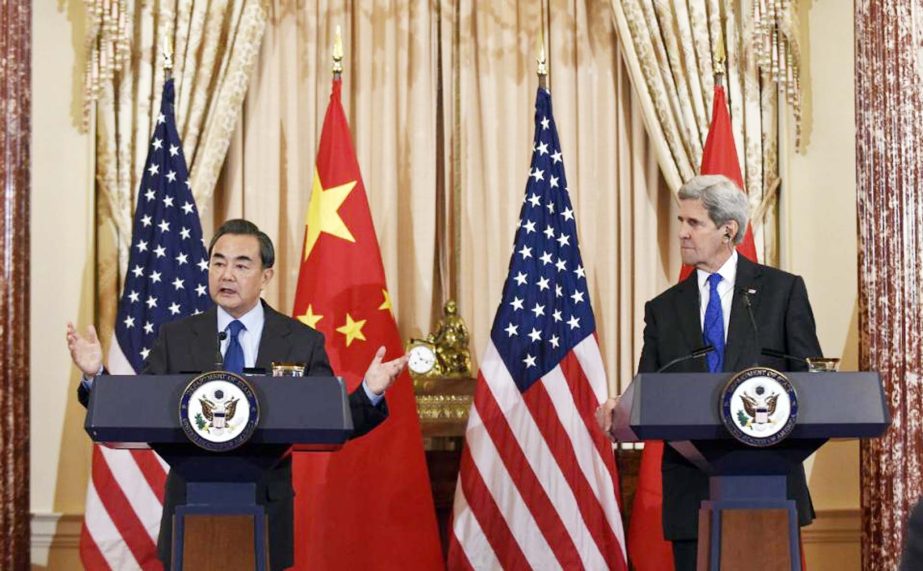
AP, Washington :
The U.S. and China showed no sign of quelling tension in the disputed South China Sea as their top diplomats met in Washington on Tuesday. A leading U.S. military officer told Congress that China was seeking to control East Asia.
But there was progress on another front. Secretary of State John Kerry and Chinese Foreign Minister Wang Yi said they were close to agreement on a U.N. resolution to punish North Korea after its recent nuclear test and rocket launch.
China has been reluctant to impose the kind of tough sanctions on its neighbor and traditional ally North Korea that the U.S. has been seeking. But an even more pervasive source of strain in the relationship between the two world powers has been over accusations over militarization in the South China Sea, an important thoroughfare for world trade.
China claims it has a historical right to most of those strategic waters, and has undertaken a massive land reclamation and construction effort on land features although five other Asian governments have territorial claims in the area. The U.S. is not a claimant but says it has an interest in maintaining peace and stability, and freedom of navigation and commerce.
The rhetoric has heated up since it emerged last week that China had Beijing deployed anti-aircraft missiles on a disputed island in the Paracels chain. Then on Monday, a U.S. think tank reported that China has built new radar facilities in the Spratly Islands, which lie further south.
The commander of U.S. forces in the Pacific, Adm. Harry Harris, confirmed Tuesday new radar on Cuarteron Reef in the Spratlys. He told the Senate Armed Services Committee that China’s construction and military facilities are changing the operational landscape in the South China Sea.
Harris said that China is militarizing the South China Sea, “and you have to believe in a flat Earth to think otherwise.”
After meeting Chinese Foreign Minister Wang Yi, Secretary of State John Kerry said that steps by China, Vietnam and others have created an escalatory cycle.
“Regrettably there are missiles, fighter aircraft, guns, artillery and other things that have been placed in the South China Sea, and this of great concern to everyone who transits and relies on the South China Sea for peaceful trade, commerce and use,” Kerry told a joint news conference. He did not elaborate on who had moved fighter aircraft to the region.
The U.S. and China showed no sign of quelling tension in the disputed South China Sea as their top diplomats met in Washington on Tuesday. A leading U.S. military officer told Congress that China was seeking to control East Asia.
But there was progress on another front. Secretary of State John Kerry and Chinese Foreign Minister Wang Yi said they were close to agreement on a U.N. resolution to punish North Korea after its recent nuclear test and rocket launch.
China has been reluctant to impose the kind of tough sanctions on its neighbor and traditional ally North Korea that the U.S. has been seeking. But an even more pervasive source of strain in the relationship between the two world powers has been over accusations over militarization in the South China Sea, an important thoroughfare for world trade.
China claims it has a historical right to most of those strategic waters, and has undertaken a massive land reclamation and construction effort on land features although five other Asian governments have territorial claims in the area. The U.S. is not a claimant but says it has an interest in maintaining peace and stability, and freedom of navigation and commerce.
The rhetoric has heated up since it emerged last week that China had Beijing deployed anti-aircraft missiles on a disputed island in the Paracels chain. Then on Monday, a U.S. think tank reported that China has built new radar facilities in the Spratly Islands, which lie further south.
The commander of U.S. forces in the Pacific, Adm. Harry Harris, confirmed Tuesday new radar on Cuarteron Reef in the Spratlys. He told the Senate Armed Services Committee that China’s construction and military facilities are changing the operational landscape in the South China Sea.
Harris said that China is militarizing the South China Sea, “and you have to believe in a flat Earth to think otherwise.”
After meeting Chinese Foreign Minister Wang Yi, Secretary of State John Kerry said that steps by China, Vietnam and others have created an escalatory cycle.
“Regrettably there are missiles, fighter aircraft, guns, artillery and other things that have been placed in the South China Sea, and this of great concern to everyone who transits and relies on the South China Sea for peaceful trade, commerce and use,” Kerry told a joint news conference. He did not elaborate on who had moved fighter aircraft to the region.

